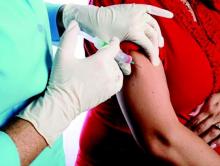An investigational trivalent group B streptococcal vaccine given to pregnant women produced elevated antibody levels in their infants, indicating that the infants likely were protected by passive immunity, according to a report published online Jan. 11 in Obstetrics & Gynecology.
A maternally administered vaccine was proposed as possibly the most effective means of preventing group B strep disease “across the entire period of vulnerability in newborns.” In this phase II randomized study performed at two sites in Belgium and three in Canada, levels of GBS-specific antibodies were assessed in infants of 86 healthy women vaccinated at 24-35 weeks’ gestation.
A total of 51 women received active vaccine and 35 received a placebo injection in the 2-year trial, which was supported by Novartis Vaccines and Diagnostics, maker of this investigational vaccine, according to Dr. Gilbert G.G. Donders of Femicare Clinical Research for Women, Tienen, Belgium, and his associates.
Mean maternal antibody levels increased by 16-fold to 23-fold after vaccination. Levels of antibody transfer, as measured in cord blood samples or needlestick samples from the neonate at birth, ranged from 66% to 79% – which is comparable to levels seen after maternal immunization with other vaccines such as those against Haemophilus influenzae type b or meningococcal disease.
At 3 months of age, antibody levels in the infants had decreased to approximately 22%-25% of what they had been at birth, but this was still 5-8 times higher than antibody levels in the placebo group, the investigators reported (Obstet Gynecol. 2016;127:214-22. doi: 10.1097/AOG.0000000000001190).
Neither the mothers nor the infants showed any “concerning safety signals.” One-minute and 5-minute Apgar scores were similar between the two study groups, and the percentage of infants who achieved “normal” scores on developmental measures also was similar: 71%-96% at 5 months and 93%-100% at 7 months in both groups. One newborn developed perinatal asphyxia, “which was considered possibly related to vaccination because no other obvious cause was present,” the researchers noted.
In addition, there was a possibility that the investigational vaccine contained a compound that might interfere with the infant’s response to routine diphtheria immunization. But no such interference was detected when these responses were measured after the infants received their final diphtheria vaccination, according to the researchers.
Novartis Vaccines and Diagnostics, whose non-influenza human vaccine business was recently transferred to GlaxoSmithKline, sponsored the study. Dr. Donders received research fees for undertaking the trial, other coauthors received research funding from Novartis, and four coauthors were employed by Novartis at the time of the study.


